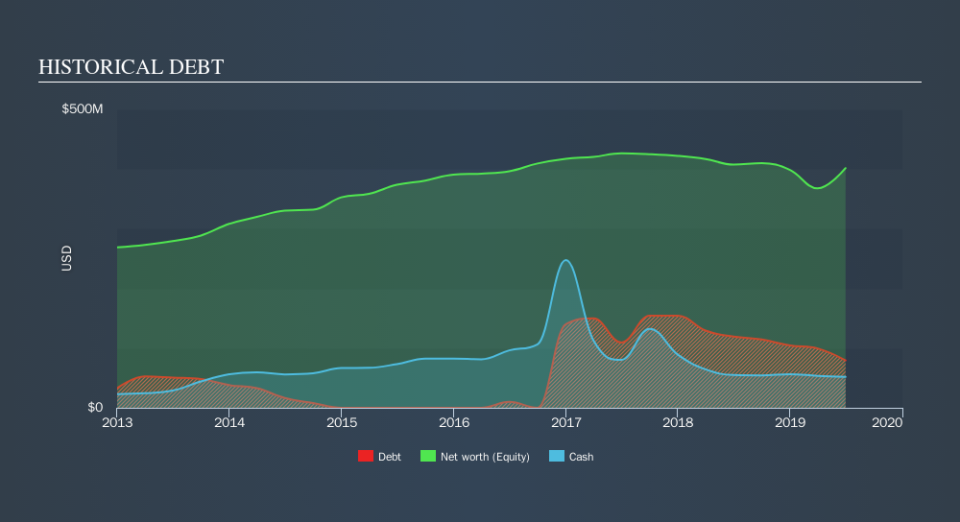Natus Medical (NASDAQ:NTUS) Could Easily Take On More Debt

The external fund manager backed by Berkshire Hathaway's Charlie Munger, Li Lu, makes no bones about it when he says 'The biggest investment risk is not the volatility of prices, but whether you will suffer a permanent loss of capital. So it might be obvious that you need to consider debt, when you think about how risky any given stock is, because too much debt can sink a company. We can see that Natus Medical Incorporated (NASDAQ:NTUS) does use debt in its business. But the real question is whether this debt is making the company risky.
What Risk Does Debt Bring?
Debt is a tool to help businesses grow, but if a business is incapable of paying off its lenders, then it exists at their mercy. In the worst case scenario, a company can go bankrupt if it cannot pay its creditors. However, a more common (but still painful) scenario is that it has to raise new equity capital at a low price, thus permanently diluting shareholders. By replacing dilution, though, debt can be an extremely good tool for businesses that need capital to invest in growth at high rates of return. When we examine debt levels, we first consider both cash and debt levels, together.
See our latest analysis for Natus Medical
What Is Natus Medical's Debt?
You can click the graphic below for the historical numbers, but it shows that Natus Medical had US$79.6m of debt in June 2019, down from US$119.4m, one year before. However, it also had US$52.0m in cash, and so its net debt is US$27.6m.
How Healthy Is Natus Medical's Balance Sheet?
The latest balance sheet data shows that Natus Medical had liabilities of US$137.7m due within a year, and liabilities of US$88.8m falling due after that. Offsetting these obligations, it had cash of US$52.0m as well as receivables valued at US$106.9m due within 12 months. So its liabilities total US$67.5m more than the combination of its cash and short-term receivables.
Of course, Natus Medical has a market capitalization of US$1.03b, so these liabilities are probably manageable. But there are sufficient liabilities that we would certainly recommend shareholders continue to monitor the balance sheet, going forward.
We use two main ratios to inform us about debt levels relative to earnings. The first is net debt divided by earnings before interest, tax, depreciation, and amortization (EBITDA), while the second is how many times its earnings before interest and tax (EBIT) covers its interest expense (or its interest cover, for short). Thus we consider debt relative to earnings both with and without depreciation and amortization expenses.
Looking at its net debt to EBITDA of 0.48 and interest cover of 4.6 times, it seems to us that Natus Medical is probably using debt in a pretty reasonable way. So we'd recommend keeping a close eye on the impact financing costs are having on the business. Pleasingly, Natus Medical is growing its EBIT faster than former Australian PM Bob Hawke downs a yard glass, boasting a 160% gain in the last twelve months. The balance sheet is clearly the area to focus on when you are analysing debt. But ultimately the future profitability of the business will decide if Natus Medical can strengthen its balance sheet over time. So if you're focused on the future you can check out this free report showing analyst profit forecasts.
But our final consideration is also important, because a company cannot pay debt with paper profits; it needs cold hard cash. So we clearly need to look at whether that EBIT is leading to corresponding free cash flow. Over the last three years, Natus Medical actually produced more free cash flow than EBIT. That sort of strong cash generation warms our hearts like a puppy in a bumblebee suit.
Our View
The good news is that Natus Medical's demonstrated ability to convert EBIT to free cash flow delights us like a fluffy puppy does a toddler. But truth be told we feel its interest cover does undermine this impression a bit. We would also note that Medical Equipment industry companies like Natus Medical commonly do use debt without problems. Overall, we don't think Natus Medical is taking any bad risks, as its debt load seems modest. So the balance sheet looks pretty healthy, to us. Another factor that would give us confidence in Natus Medical would be if insiders have been buying shares: if you're conscious of that signal too, you can find out instantly by clicking this link.
If, after all that, you're more interested in a fast growing company with a rock-solid balance sheet, then check out our list of net cash growth stocks without delay.
We aim to bring you long-term focused research analysis driven by fundamental data. Note that our analysis may not factor in the latest price-sensitive company announcements or qualitative material.
If you spot an error that warrants correction, please contact the editor at editorial-team@simplywallst.com. This article by Simply Wall St is general in nature. It does not constitute a recommendation to buy or sell any stock, and does not take account of your objectives, or your financial situation. Simply Wall St has no position in the stocks mentioned. Thank you for reading.


